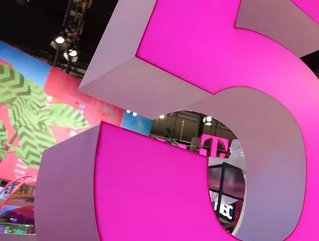MWC 2021 big trend breakdown

As the cloud from COVID-19 starts to lift, it’s exciting to see in-person events taking place again.
With Mobile World Congress taking place as a ‘hybrid-in-person and online’ event this month, it's no surprise that hybrid - in every sense of the word - continues to be a major focus among world leaders. This year, I expect that we will see and feel the impact of 5G with a new perspective – one ignited by the events of 2020 that has forced technologies that enable a hybrid, or fluid workforce, into the spotlight.
Hybrid. The world remains remote. So, edge computing is back in the spotlight
In the first few months of 2021, 1 in 7 jobs from VC-backed companies were offered as remote job opportunities. This is 2x the average across the U.S., and up from 1 in a 100 in 2020. While a lot of traditional industries are returning to the office - remote working is here to stay.
The kind of work that ‘had’ to be in the office, is now being done at home. This puts a spotlight on end point edge computing. Workers that remain remote will require long-term connectivity at home and, importantly, the right security infrastructure. E.g. – the modem in your home is unlikely to have the same level of protection as in the corporate office. The security paradigm is shifting – where does the responsibility lie?
5G impact on price and offer
5G has looooong been talked about, but 5G coverage falls short outside of metro areas and widespread use is not prevalent. This year, we will (finally) see the conversation shift from 5G roll out to direct customer impact.
The impact of 5G will change how people think about networking. Distinct categories of service levels, faster communications, and the ability to collect more data. The connected impact is on price and offer. It is no longer ‘one size fits all’ for text, voice, and data - it is now ‘fewer sizes fit less.’
5G impact on mobile gaming
The Gaming and Esports industry have accelerated three-four years due to the pandemic. There is a new set of gamers that are more passionate, and they are driving the gaming ecosystem further than we had ever anticipated.
The impact of 5G will help drive a new conversation around the emergence of cloud native gaming. We are at the very beginning of the cloud native gaming opportunity. There are not a lot of cloud native games out there yet, but investment in game studios to build them is happening.
There is now a stronger focus on hybrid environment and gaming behaviors. Where ‘cross platform’ gaming becomes the norm. Edge computing will also play a role here – whether you are on a mobile device, a specked-up machine or console - the goal is to deliver the same experience for the gamer.
5G slicing and Open RAN
Cohere, one of our portfolio companies, recently demonstrated how a powerful new Open Radio Access Network (RAN) platform can further boost the capacity of 5G where multiple customers can use the same site.
A new deal with Vodafone highlights that with Cohere’s technology they can double or quadruple the amount of bandwidth over a certain amount of spectrum. That means that you can put between 2-4 times the content over the same amount of wireless spectrum. There is a huge cost benefit to this, and I expect to see the impact as new opportunities as a result.
This also means that networks will learn to slice their network more finely. They'll be able to price more accurately to add value for different consumers. People that want 24/7, high up times may pay more, vs. People who are ok with slower speeds to get a better rate.
Will this free capital for investment in services vs. investment in infrastructure thus unleashing massive innovation cycles?
The rise of "Coopetition"
The emergence of the “Telco Cloud” and new public cloud players. We can expect to see the coopetition between Telcos and Hyperscalers. It might solve the immediate problem of access – but we will still need more pipes in the ground to solve the infrastructure challenge.
5G is the opportunity to foster collaboration but also reignites the battle over who will control the revenue streams, particularly around multi-access edge computing (MEC.)






